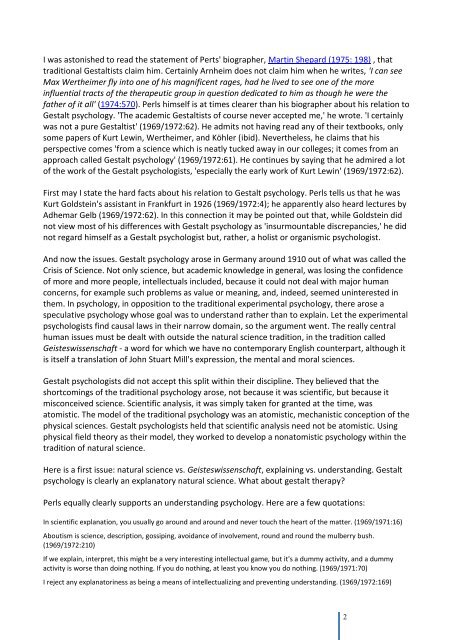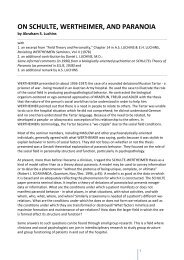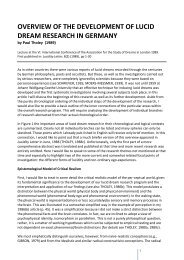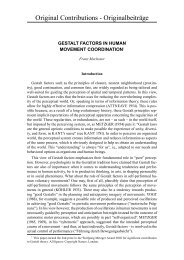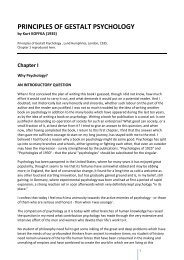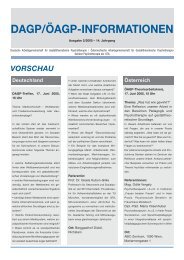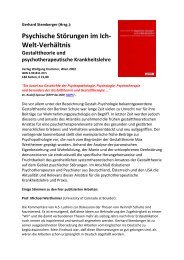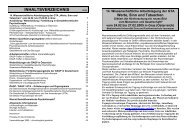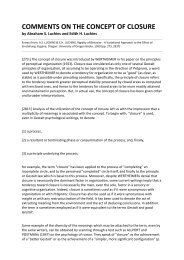Mary HENLE - Society for Gestalt Theory and its Applications (GTA)
Mary HENLE - Society for Gestalt Theory and its Applications (GTA)
Mary HENLE - Society for Gestalt Theory and its Applications (GTA)
- No tags were found...
Create successful ePaper yourself
Turn your PDF publications into a flip-book with our unique Google optimized e-Paper software.
I was astonished to read the statement of Perts' biographer, Martin Shepard (1975: 198) , thattraditional <strong>Gestalt</strong>ists claim him. Certainly Arnheim does not claim him when he writes, 'I can seeMax Wertheimer fly into one of his magnificent rages, had he lived to see one of the moreinfluential tracts of the therapeutic group in question dedicated to him as though he were thefather of it all' (1974:570). Perls himself is at times clearer than his biographer about his relation to<strong>Gestalt</strong> psychology. 'The academic <strong>Gestalt</strong>ists of course never accepted me,' he wrote. 'I certainlywas not a pure <strong>Gestalt</strong>ist' (1969/1972:62). He adm<strong>its</strong> not having read any of their textbooks, onlysome papers of Kurt Lewin, Wertheimer, <strong>and</strong> Köhler (ibid). Nevertheless, he claims that hisperspective comes 'from a science which is neatly tucked away in our colleges; it comes from anapproach called <strong>Gestalt</strong> psychology' (1969/1972:61). He continues by saying that he admired a lotof the work of the <strong>Gestalt</strong> psychologists, 'especially the early work of Kurt Lewin' (1969/1972:62).First may I state the hard facts about his relation to <strong>Gestalt</strong> psychology. Perls tells us that he wasKurt Goldstein's assistant in Frankfurt in 1926 (1969/1972:4); he apparently also heard lectures byAdhemar Gelb (1969/1972:62). In this connection it may be pointed out that, while Goldstein didnot view most of his differences with <strong>Gestalt</strong> psychology as 'insurmountable discrepancies,' he didnot regard himself as a <strong>Gestalt</strong> psychologist but, rather, a holist or organismic psychologist.And now the issues. <strong>Gestalt</strong> psychology arose in Germany around 1910 out of what was called theCrisis of Science. Not only science, but academic knowledge in general, was losing the confidenceof more <strong>and</strong> more people, intellectuals included, because it could not deal with major humanconcerns, <strong>for</strong> example such problems as value or meaning, <strong>and</strong>, indeed, seemed uninterested inthem. In psychology, in opposition to the traditional experimental psychology, there arose aspeculative psychology whose goal was to underst<strong>and</strong> rather than to explain. Let the experimentalpsychologists find causal laws in their narrow domain, so the argument went. The really centralhuman issues must be dealt with outside the natural science tradition, in the tradition calledGeisteswissenschaft - a word <strong>for</strong> which we have no contemporary English counterpart, although itis <strong>its</strong>elf a translation of John Stuart Mill's expression, the mental <strong>and</strong> moral sciences.<strong>Gestalt</strong> psychologists did not accept this split within their discipline. They believed that theshortcomings of the traditional psychology arose, not because it was scientific, but because itmisconceived science. Scientific analysis, it was simply taken <strong>for</strong> granted at the time, wasatomistic. The model of the traditional psychology was an atomistic, mechanistic conception of thephysical sciences. <strong>Gestalt</strong> psychologists held that scientific analysis need not be atomistic. Usingphysical field theory as their model, they worked to develop a nonatomistic psychology within thetradition of natural science.Here is a first issue: natural science vs. Geisteswissenschaft, explaining vs. underst<strong>and</strong>ing. <strong>Gestalt</strong>psychology is clearly an explanatory natural science. What about gestalt therapy?Perls equally clearly supports an underst<strong>and</strong>ing psychology. Here are a few quotations:In scientific explanation, you usually go around <strong>and</strong> around <strong>and</strong> never touch the heart of the matter. (1969/1971:16)Aboutism is science, description, gossiping, avoidance of involvement, round <strong>and</strong> round the mulberry bush.(1969/1972:210)If we explain, interpret, this might be a very interesting intellectual game, but it's a dummy activity, <strong>and</strong> a dummyactivity is worse than doing nothing. If you do nothing, at least you know you do nothing. (1969/1971:70)I reject any explanatoriness as being a means of intellectualizing <strong>and</strong> preventing underst<strong>and</strong>ing. (1969/1972:169)2


